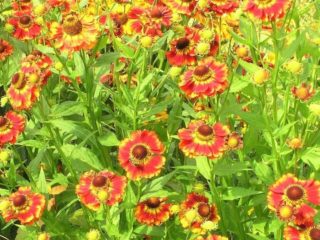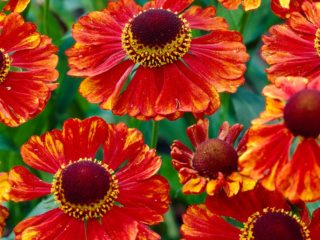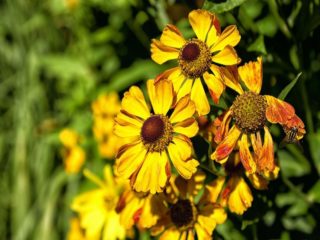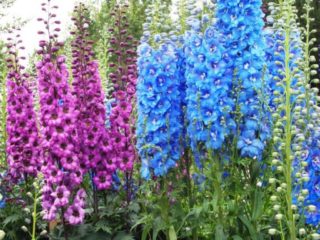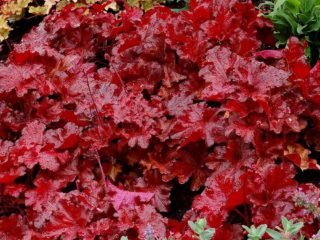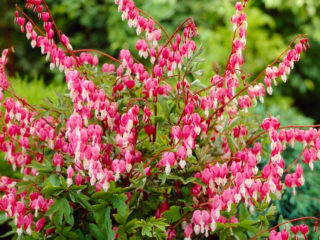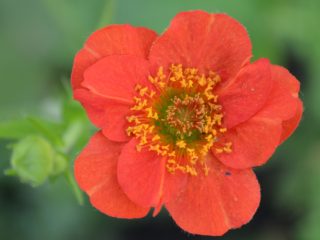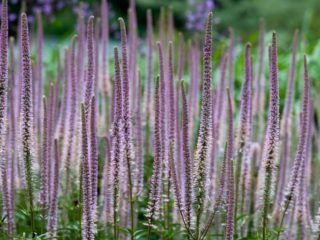Content
Late-flowering ornamental plants, which include perennial helenium, have always been popular among amateurs and landscape design professionals. They perfectly decorate gardens, house flower beds, alleys and parks at a time when most other plants are already losing their beautiful appearance. At the same time, caring for such perennials is simple and usually does not cause difficulties.
Description of perennial helenium
It is believed that Helenium received its name in honor of Helen, the daughter of the Spartan king Minelaus. According to ancient Greek mythology, at that time she was considered the most beautiful of women, and it was her abduction that caused the well-known Trojan War. Helenium perennial is really very beautiful.Under natural conditions, this plant can be seen in the southwestern part of the North American continent, as well as in the countries of Central and South America. It is used everywhere for decorative purposes.
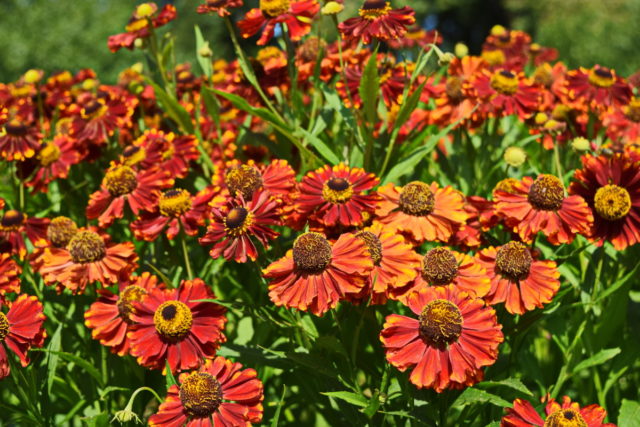
There are 32 varieties of helenium in nature.
Below are the different varieties and varieties of helenium with photos and names. A brief description of the plant and its characteristics are listed in the table:
Parameter | Meaning |
View | Perennial or annual herbaceous plant |
Family | Compositae |
Stem | Single or branched, highly branched in the upper part, straight, hard, green |
Plant height | Depending on the variety, from 0.4 to 1.8 m |
Leaves | Oval, sessile, bright green, elongated spear-shaped or lanceolate, with a smooth or slightly jagged edge |
Root system | Fibrous, creeping, rod-shaped in some varieties |
Flowers | Chamomile-type basket inflorescences with a spherical yellow or brown central part and differently colored petals along the periphery |
Purpose | For landscaping and garden decoration or for cutting |
Perennial heleniums have one interesting feature. Their root system, like the above-ground part, dies off in winter. In spring, a new stem begins from the growth bud of an annual shoot, which overwinters underground.
Photo of helenium flowers in a flowerbed:
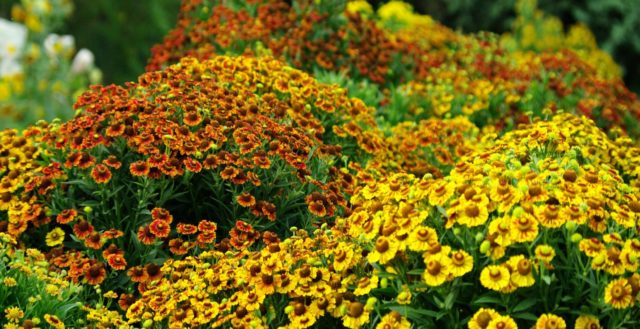
You can create entire compositions from helenium
Types and varieties of perennial helenium
There are many types of perennial helenium. However, not all of them are used in ornamental gardening.Most often, varieties and hybrids bred on the basis of certain varieties are used for landscaping and decorating a site.
Helenium hybrid
Hybrid Helenium (lat. Helenium Hybridum) includes varieties of uncertain origin, obtained on the basis of the autumn variety of this plant. This is a fairly large group. It includes most perennial varieties used in ornamental gardening.
Gartenzonne
The Gartensonne variety is widely used as a border variety. The average height of plants is 1-1.2 m. The tubular part is yellowish-brown, the reed part is yellow with a reddish coating. Flowering time is from the end of July to the first ten days of September.
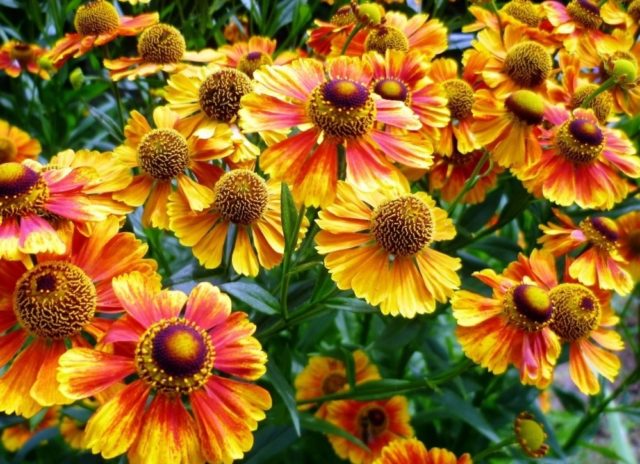
The size of Gartenzonne flower baskets reaches 4 cm
Grimson Beauty
Grimson (Crimson) Beauty (Crimson Beauty) - a variety with a reddish-bronze color of the reed part of the inflorescences. The tubes are yellow-brown. The plant can reach a height of 0.7 m. The flower basket is large, up to 5.5 cm in diameter.
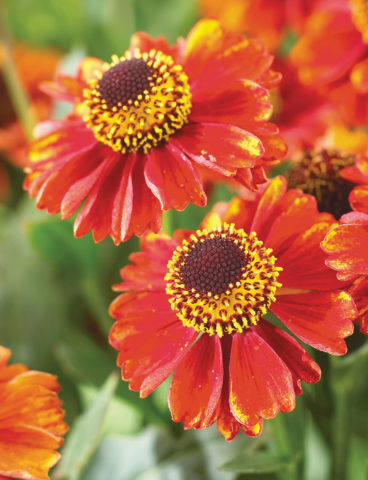
The Grimson Beauty variety is used both for bouquets and for decorating areas
Betty
Helenium Betty is a two-color variety. The petals are twisted, the bottom is raspberry-red, and the top is yellow. The size of the baskets can reach 7.5 cm. The tubular central part is yellowish-brown.
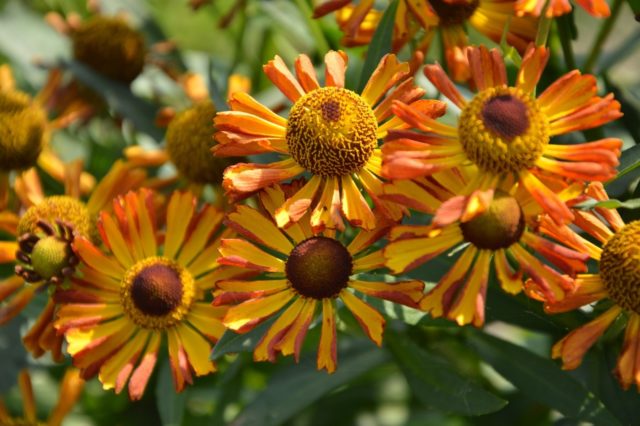
The height of the Betty bush is 0.6-0.7 m
Brassingham Gold
A distinctive feature of the Bressingham Gold variety is the juicy bright yellow color of the reed part of the inflorescence. The diameter of the baskets is 3.5-4 cm. The tubular part is brown-yellow. The plant is quite tall.
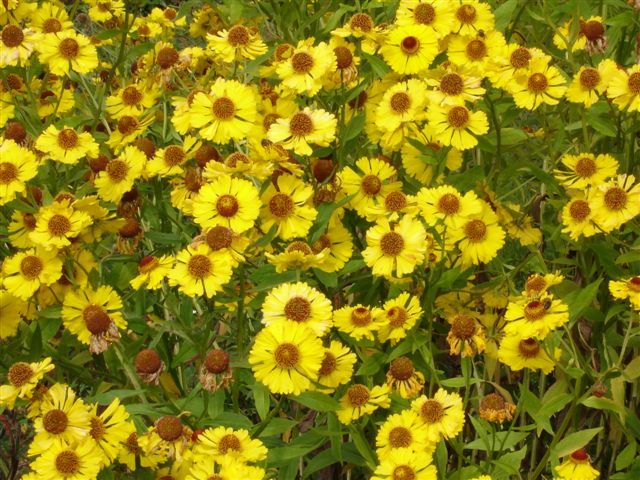
The height of Brassingham Gold can reach 1.8 m
Ranchera
The perennial variety Ranchera has dark red petals and a greenish-purple center.The bush is small and compact, its average height is 0.4-0.6 m.
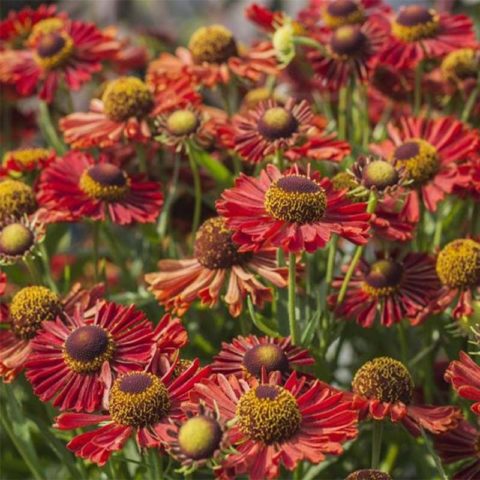
The flowering period of Ranchera is about 40 days, it lasts from July to September
Riverton Jam
Helenium perennial Riverton Gem can grow up to 1 m in height. The ligules are golden-red, the tubular central part is greenish-brown with yellow pollen. The peculiarity of this variety is that the petals of the fully open flower are slightly lowered down, they form a kind of “skirt”.
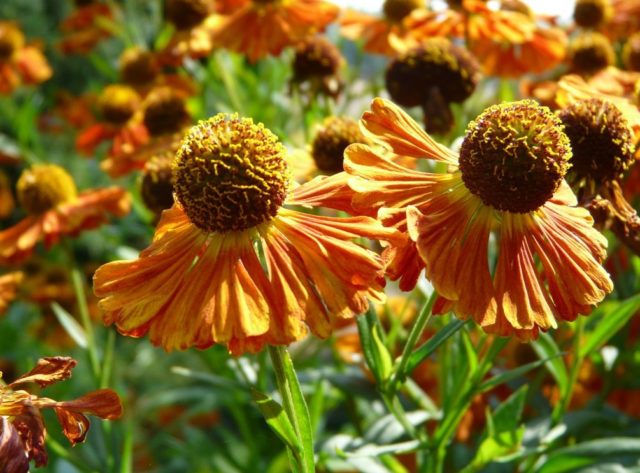
Low-growing Riverton Gem works well in borders
Fuego
Helenium Fuego is a low-growing variety and is widely used as a border plant, as well as for cutting. The height of the bush is 0.4-0.6 m. The petal part of the inflorescence is bordered, red-orange, the center is brownish. Flowering is abundant and long, from August to October.
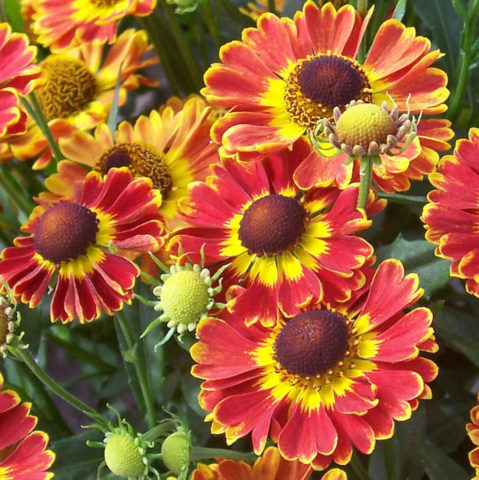
Only fully opened Fuego flowers are suitable for cutting.
Moerheim Beauty
Moerheim Beauty is a perennial variety of helenium with bright, rich red flowers with an orange tint. The baskets are large, up to 6.5 cm. The petals are slightly bent downwards.
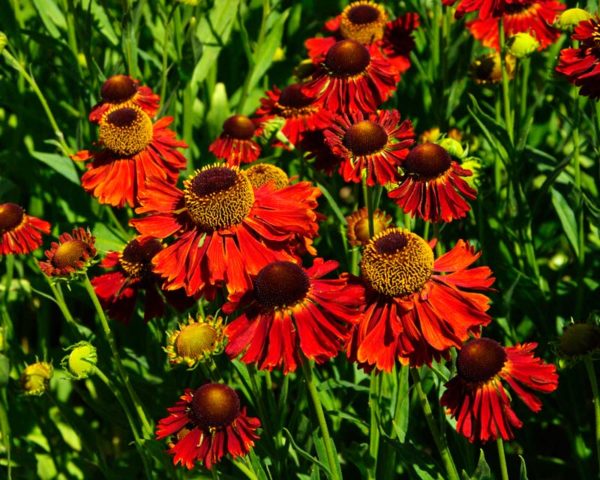
The average height of Moerheim Beauty is about 1.1 m
Poncho
Helenium perennial variety Poncho can grow up to 0.6-0.7 m. It blooms from July to September. The petals are bright, rich red-orange, with a yellow edge. The central tubular part is yellow-brown.
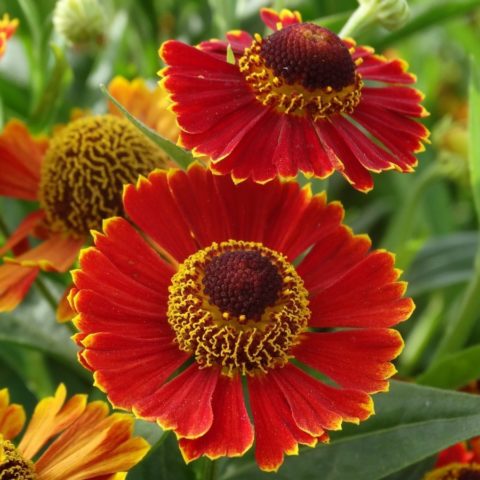
Basket Poncho medium size, 3-4 cm
Helenium autumn
Helenium autumnale is one of the varieties of this perennial plant; it includes many cultivated varieties. Their main color is a combination of yellow and red colors of varying intensities. Plant height is up to 1.6 m.
Autumn serenade
The mix variety is a mixture of yellow and red flowers. Plant height is about 1.2 m. It blooms from July to early September.
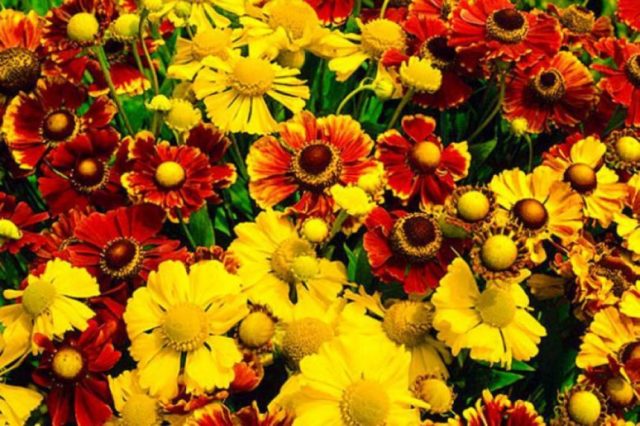
Autumn Serenade is great for cutting
Sunrise
Helenium Sunrise has slightly drooping petals. The central part is reddish-brown. Plant height is about 1.3 m.
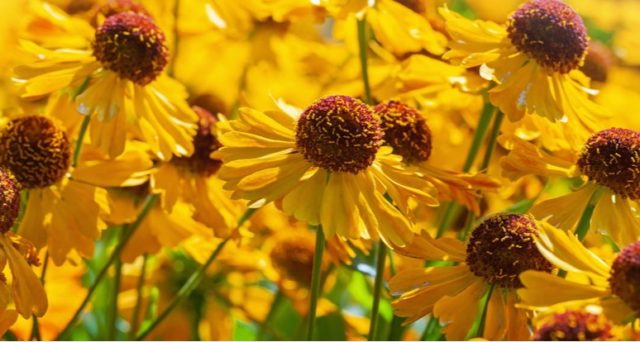
Sunrise has lemon-colored petals
Biedermeier
The Biedermeier variety is widely used in ornamental gardening for single plantings and creating boards. The height of the plant is 0.6-0.8 m. The petals are rich yellow, with a scarlet gap in the middle part, the tubes are darker, brownish. The diameter of the baskets is about 4 cm.
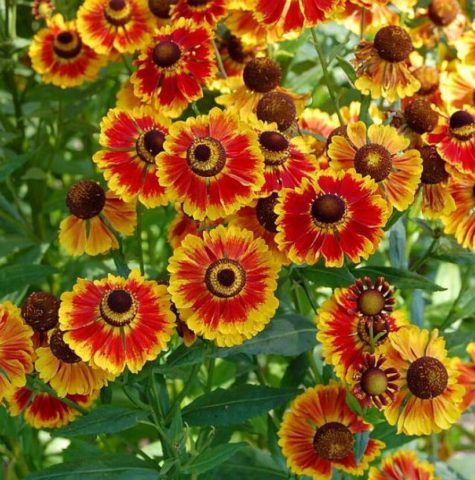
The Biedermeier variety is characterized by long and abundant flowering
Ruby Tuesday
The Ruby Tuesday variety grows as a small compact bush about 0.5-0.6 m high. The color of the petals is ruby-red, the tubes in the central part are yellow and brown-burgundy. Flowering is friendly and numerous, lasting from mid-July to early September.
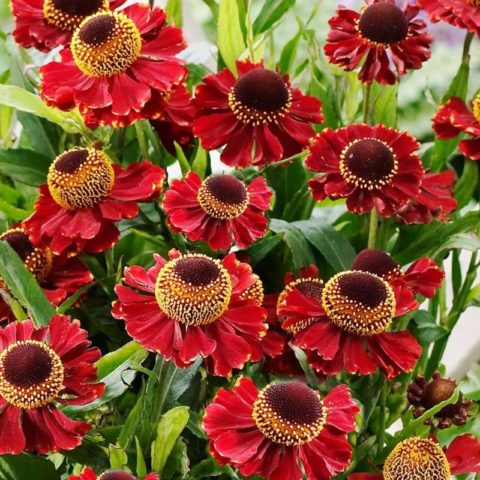
Ruby Tuesday's baskets are numerous, but small, 2.5-3 cm in diameter
Bandera
Helenium perennial Bandera (Bandera) is a two-color plant, the reeds are dark red, edged with golden yellow. The tubes are brown. The baskets are not large.
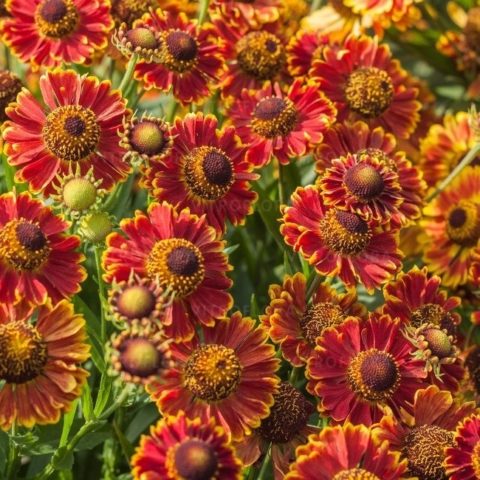
The Bandera variety is distinguished by strong branching and abundant flowering
Autumn Jazz
The inflorescence-basket of this variety of perennial helenium is quite large, reaching a diameter of 6 cm. The reeds are lemon-colored or burgundy-red, with a yellow border, the center is brown-yellow.
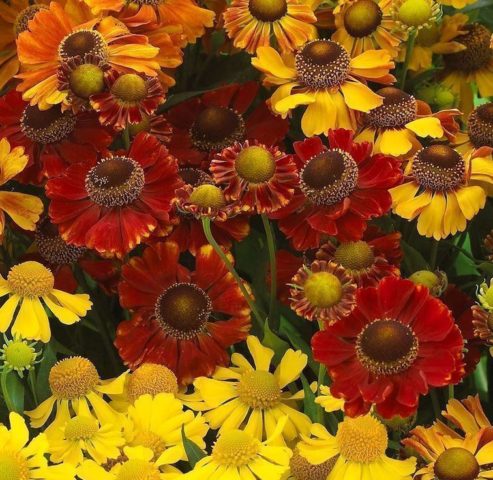
Plant height Autumn Jazz - up to 1.2 m
Hot Lava
Perennial helenium Hot Lava blooms from July to September.The petals are deep red, with beautiful amber strokes. The tubes are dark, brownish-burgundy. The average height of the bush is about 0.8 m.
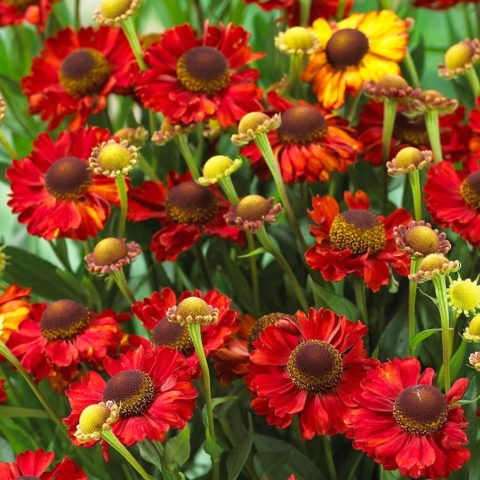
The average flowering period for Hot Lava is 40-45 days
Helena
This red variety of perennial Helenium is more often called Helena Red. The plant blooms profusely from late July to mid-September, the baskets are medium in size, 3-5 cm. The inflorescence tongues are red-brown with a yellow edging, the tubes are darker. The average height is about 1.1 m.
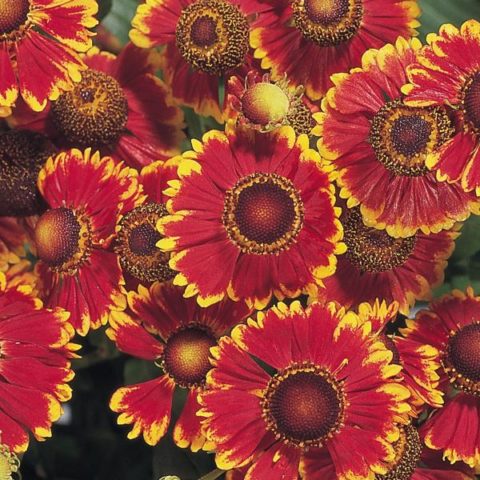
Helena variety can be used for cutting
Chelsea
Helenium perennial Chelsea (Chelsey) can grow up to 0.7-0.75 m. Inflorescences with crimson tongues and yellow edging. The center is brown. The flowers stand well as cut flowers.

Chelsea blooms from July to September
Salsa
The perennial Helenium variety Salsa is a low-growing variety, the plant grows up to 0.4-0.5 m. The petals are orange-red, the central disc is brown. Flowering time is from July to September.
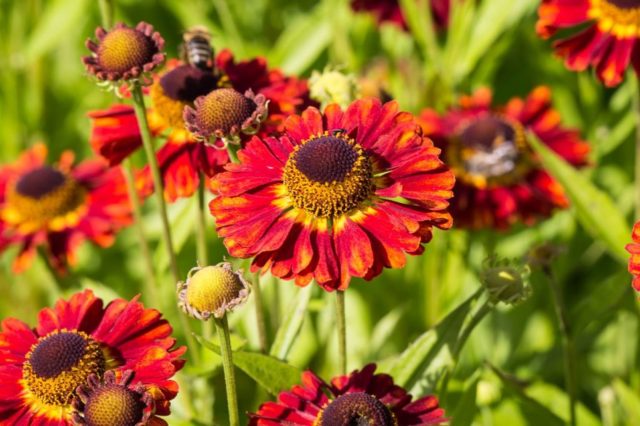
Low grade Salsa looks great as a background
Sombrero
The Sombrero variety has a bright yellow rich color, both petals and tubes. The height of the plant is 0.4-0.5 m.
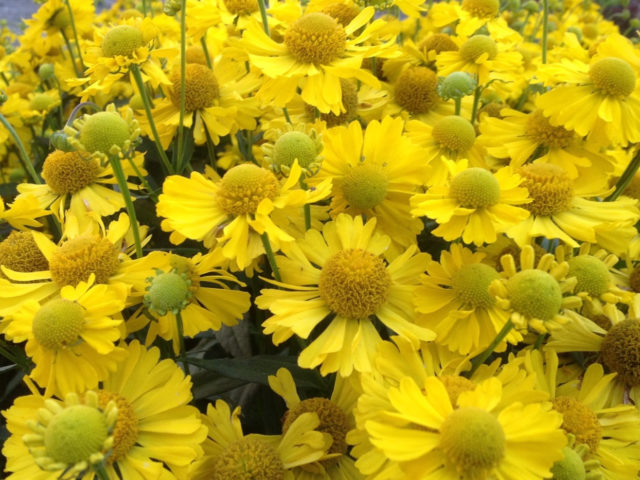
Sombrero flowering period is from August to October
Double Trouble
Helenium perennial Double Trouble blooms for a long time, from June to September. Peduncles are strong and branched. The bush is compact, up to 0.7 m high. The color of the petals is bright yellow, the tubes are greenish.
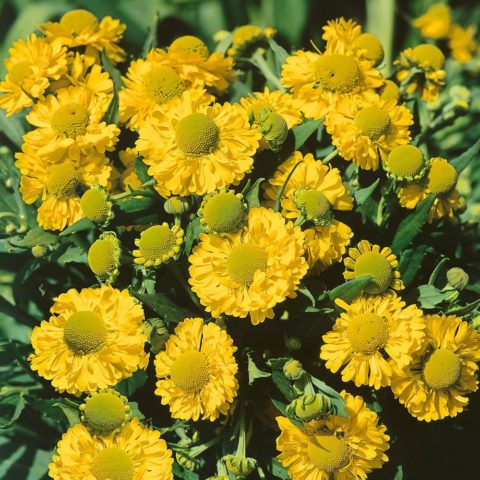
Double Trouble - the first variety with double inflorescences
Red Jewel
Helenium perennial Red Jewel is medium in size, the plant height is usually 0.6-0.8 m.The petals are colored very unusually, red with a beetroot tint, on which orange strokes appear. The central part is brownish-purple.
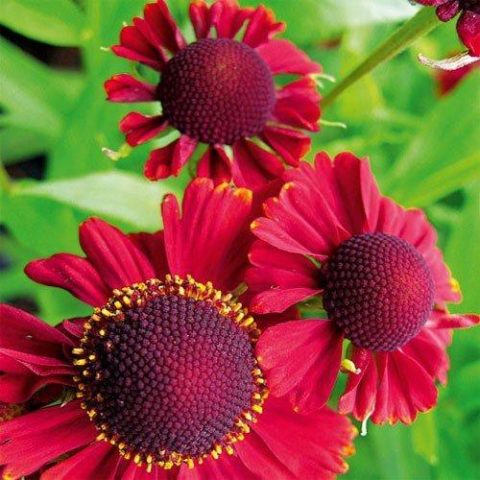
Red Jewel baskets medium size, 4.5-5 cm
Helenium Hupa
Helenium hoopesii (Helenium hoopesii) is a perennial herbaceous plant for open ground up to 0.8 m high. In the wild, the natural habitat of this species is the Rocky Mountains of North America. The leaves are green with a bluish tint, large, lanceolate, forming a basal rosette. Peduncles are single, straight, bare, strong, baskets are large, up to 10 cm in diameter.
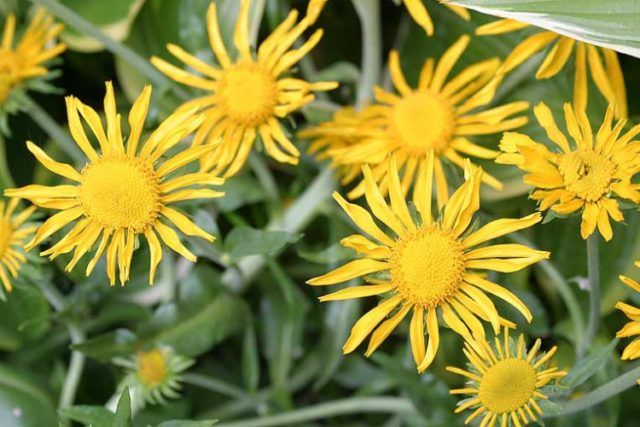
The tubes of Helenium Hupa are colored yellow
The central part of the inflorescence is flat. Flowering begins in June and continues until August.
Helenium spring
Perennial spring helenium (Helenium vernalis) can grow up to 1 m and even a little higher. Branching is weak. The leaves are dark green, medium-sized, lanceolate, sessile. Flowers appear already in the 2nd half of May. They are yellowish-orange, with a brown center, the diameter of the baskets is up to 7 cm. Flowering continues until the end of June.
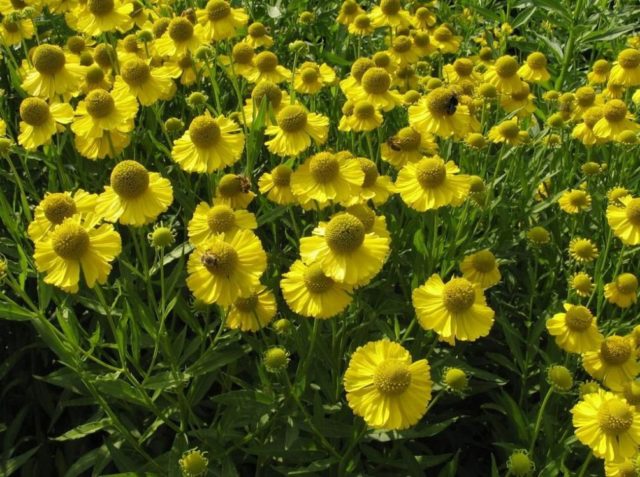
Helenium spring blooms earlier than other varieties
Helenium Bigelow
The homeland of Helenium bigelovii is North America, or rather its western part. In ornamental gardening, this species is used least of all. The plant is a rosette of lanceolate leaves, from the center of which grows a branched stem in its upper part up to 0.8 m high.
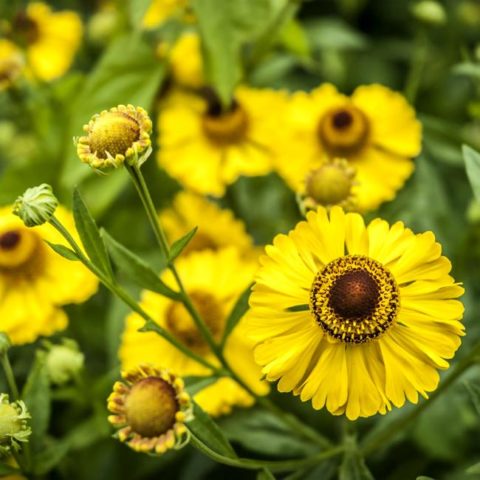
In nature, this species has a very limited growing area.
Budding occurs in June.The basket inflorescences reach 6 cm in diameter, their central tubular part is brown, the petals-tongues are yellow. Bigelow perennial blooms during June-July.
Helenium fragrant
Helenium fragrant (Helenium aromaticum) is also known as “strawberry grass”. In appearance, the plant resembles a rounded herbaceous bush 0.5-0.75 m high, since numerous shoots begin to depart from the main stem already at the base. The root is powerful, taproot. The leaves are bright green, small, lanceolate, often with a serrated edge, the blade is slightly pubescent.
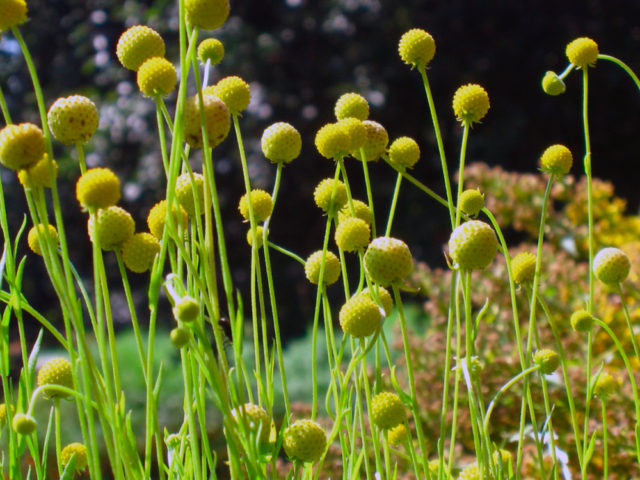
Unlike many other varieties, helenium aromaticum is an annual plant.
The inflorescences are small, spherical, yellow-green, up to 1 cm in diameter. This variety is used mainly in the confectionery industry and cooking, since the leaves, stems and inflorescences contain a large amount of essential oils and substances. In addition, aromatic helenium is used as a seasoning for vegetable crops, and for decorative purposes - for landscaping park areas as an alternative to lawn grass.
Helenium in landscape design
In landscape design, perennial helenium is used both in individual and group plantings. Tall varieties look great near walls and fences. They can be planted in multi-level flower beds, along paths and alleys, and used as a low hedge or border. Low-growing varieties are widely used to create a color background, as background and third plants. Colorful, abundantly flowering perennial bushes will be an excellent accent in any corner of the garden.
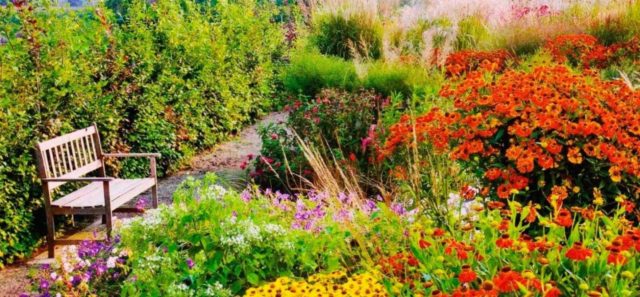
This plant looks especially impressive when creating a rustic design.
Helenium perennial is a moisture-loving plant, so it thrives near water bodies. It is often planted near artificial backwaters, ponds, fountains, and streams.
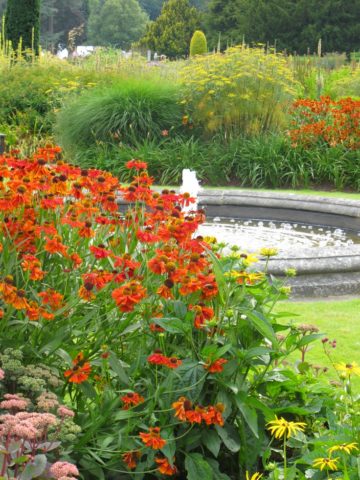
Increased soil moisture is mandatory for helenium
Helenium perennial goes well with many plants. Therefore, it is often used in mixborders. Good neighbors for red and burgundy varieties are white flowers: chrysanthemums, daisies, asters.
Yellow types of perennial helenium look great in combination with purple, blue, and red flowers. Next to it you can plant sage, monarda, and chrysanthemums.
Landscape designers and flower growers love perennial helenium not only for its beauty, but also for its ease of care and propagation. It is very easy to propagate the plant yourself by dividing the bush, and in some cases you can use the seed method. Helenium is unpretentious, almost not affected by diseases and pests, since all its parts are to a certain extent poisonous and bitter in taste. The use of different species and varieties allows you to combine them, creating beds of continuous flowering. Such plantings will delight you all summer and until late autumn.
Conclusion
Helenium perennial is a frequent visitor to gardens and parks. This plant is very versatile in its purpose; it can be planted individually and in combinations, creating entire compositions from varieties of different flowering periods.Helenium is a perennial unpretentious plant, it is simple and at the same time very decorative, which makes it attractive to many who like to liven up their garden plot in the gloomy autumn season.
